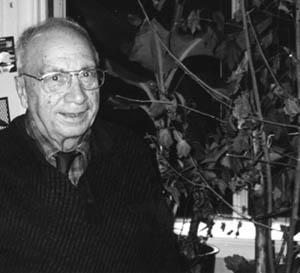|
|
| |
| Dr.
Aurelio Sirianni: An Italian Innovator |
| By
Oliviana Mingarelli |
| Life
is never easy and is often full of hurdles and obstacles. However, Dr.
Aurelio Sirianni has triumphed over all of these, proving himself to
be an extraordinary man.
Dr. Sirianni moved to Canada from a little town in
southern Italy in 1925. One of Preston Street’s first inhabitants,
he and his family planted their roots in Ottawa when he was just ten
years old. At first, many things did not come easily for the young
boy and he ended up dropping out of grade eight to pursue a technical
career. He gained a body of knowledge in this field, but soon realized
the importance of education. Upon attempting to re-enter the system,
he received much resistance from the school board who did not believe
that his technical background constituted an education and therefore
they would not allow him to attend university.
|
|
However,
with the help of one teacher’s guidance, Dr. Sirianni did attend
university, ultimately earning a Bachelor of Science from Mount Alison,
followed by a Doctorate in Chemistry from McGill University.
“Mr.
McCarthy said you go ahead and do what you want. If you put your head
to it, you can do it,” says Dr. Sirianni, remembering his teacher’s
advice. He notes that in following this direction he became the first
Italian immigrant in Ottawa to receive his PhD.
During
the summers between school years, Mr. Sirianni worked for the National
Research Council (NRC). |
 |
| Now
retired, Dr. Sirianni has time to enjoy playing bocce and caring
for his plants. |
|
|
“The
first work I did was for a private company that had nothing to do
with the NRC, but I worked directly for them. This company paid a
certain amount of money to support somebody, myself on this particular
project, because they wanted me to further research,” Dr. Sirianni
explains.
The recognition
of a research scientist’s work at such a young age does not
happen often; Sirianni’s dedication to his work must have been
apparent to many people. Dr. Sirianni worked for the NRC until his
retirement in 1979, at which point he still continued doing some research
for them.
During
his time at the NRC, he worked on a project to create lubricating
greases without a melting point, a discovery which led to much publicity
and acknowledgment of Dr. Sirianni’s research. His discovery
made it possible to almost eliminate oil changes. A test car went
over 30,000 kilometres without an oil change and was still working
fine.
“This
discovery was what gave me a little bit of notoriety but it’s
really minimal to what I did at the NRC,” says Dr. Sirianni,
chuckling.
He proceeds
to explain how he worked on many important projects including one
that aimed to reduce the amount of mercury in coal. Reducing the amounts
of mercury would help decrease air pollution. In addition, Dr. Sirianni
was given the title of Principal Researcher, a title given to less
than three percent of NRC staff.
Not only
has Dr. Sirianni been very involved in the scientific community, but
in the Italian one as well. He was the founding and current president
of the Dante Alighieri Society. The society is committed to promoting
the Italian language throughout the Ottawa area.
He is
also a member of the Order of Italo-Canadians, the Italian Business
and Professional Men’s Association and while it existed, the
Sons of Italy. This very active man also participates in a sport well
known to Italians: bocce. In fact, he and his partner won the bocce
championship four or five years ago. He told me that when he is not
playing bocce he loves to take care of his plants. He even has lemon
trees in his garage. |
|
|
Dr.
Sirianni’s connection to his culture is evident. When I asked
him about how he felt the Italian community had changed his answer
was filled with touching memories.
“Life
changes all the time. You’re interacting with more people so
it’s difficult for things to stay the same unless you isolate
yourself and forget your native language. When you start learning
other languages like English and French you begin to disperse,”
Dr. Sirianni says. |
|
“I
remember Christmas Eve, the way we celebrated it at home, it was beautiful.
Now it’s different, it’s an Anglo-Saxon atmosphere. At
home we had the presepio [the nativity scene]. I built one
for my family last year. Christmas Eve in Italy was beautiful, all
the young children like myself would go out and find wood, there were
a lot of chestnut groves and some of the branches would die off and
fall. We would pick all those sticks up and pile them together and
make a big, big fire Christmas Eve. It would last all night.”
“At
midnight the older people would march off to church and the younger
ones would stay to have apple cider and stuff like that. The adults
used to make something with flour and honey, it tasted really good.
“When
we came to Canada, my grandmother continued the tradition of the presepio.
However, over time you get away from that, it’s strange. I still
prefer a nice Christmas Eve when we go the church, the old-fashioned
way. There’s something in that you know.”
A man
of many facets, Dr. Sirianni is a remarkable and successful member
of both the Italian community and the science community. Throughout
his life Sirianni has attained over 40 patents, both in Canada and
the United States. Even though his peers have acknowledged him many
times for his research he has remained a very modest man, proud of
his heritage and family. |
| This
article was originally published in the January 2001 issue of Il
Postino. |
|
| back
to the top |
|

